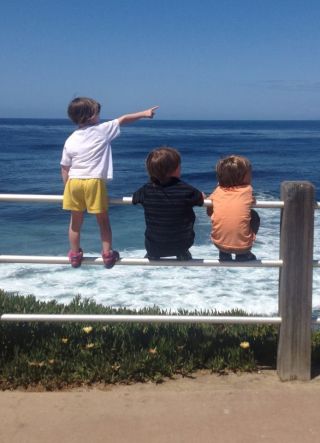
Emotion Regulation
How To Unleash Your Kids’ Skills of Emotional Regulation
Step back so that your kids can step up
Posted April 22, 2014

This blog curates the voices of the Division of Psychoanalysis (39) of the American Psychological Association. For more information on the development of emotional regulation, visit the Division's Spring Meeting, taking place in New York City this week (April 23-27). This post is submitted by Kristi Pikiewicz, PhD.
---
I have three Labradors. The old guy’s exercise used to consist almost solely of running with me, on leash (the dog was on leash, not me; though I’m sure his perception has it reversed). Then I had kids and somehow also ended up with 18-month and 8-month-old dogs. Instead of running on leash, the younger generation tends to tumble around in the field behind our house in one giant ball of kids-n-dogs, meeting passersby and cooperating to hunt field mice and each other.
The thing is, the old guy never really got along with other dogs. He was never, ever mean or aggressive; in fact, he was the opposite, bounding up to meet other dogs with his tail wagging and inevitably missing whatever K9 social cues allow dogs to meet each other without teeth and growling. In ten meetings with other dogs, he probably got himself bitten three times.
My younger dogs can meet even the meanest neighborhood mongrel without incident – or they somehow know who to avoid. In 100 meetings, they don’t get bitten once.
I’m not saying that my dogs are the key to understanding human behavior, or that I have perfect laboratory conditions in the back field, but I see the same thing in kids (and parents) in my private practice and in my consulting work with schools: kids who are kept on leash have a hard time socializing with other kids.
For example, the other day I had a distraught client who told the story of her child who “went from one to ten” so quickly – one second the child would be playing with a friend and the next second the child would be fighting. Of course, the mother was always right there so that she could stop her child from escalating.
Hundreds of articles (including THIS and THIS and THIS and THIS) show that “helicoptering” or “overprotecting” or however we define the behavior of regulating our children’s emotions for them, makes our children dependent on us to shape their internal emotional worlds.
Winnicott and other psychoanalysts show that when a child is very young, the child “gives” their parent an emotion, at which point the parent processes the emotion and gives it back to the child transformed (hopefully into something the child is then able to deal with). But then through this process as the child becomes more able to take on these duties of emotional regulation him- or herself, if a parent stays stuck in the old paradigm in which their help was needed, it can slow the child’s further emotional growth.
I’m not suggesting neglect. But within reason and always with you as a safety net of unconditional love, leaving children to sort out their own conflicts will make them better able to sort our these conflicts without your help in the future. For my kids, it’s not always pretty: what starts as good-natured wrestling sometimes becomes fighting. But if you give it a second, the kids tend to regulate themselves or pick up on the other’ssignals and respond appropriately. But when I jump in, things get complicated by my adult presence: one kid starts crying saying they got hurt while the other goes to the corner of the playground to cry.
Obviously, it’s never okay to let your child bully or be bullied, but allowing kids the opportunity to self-regulate is one of the greatest gifts we can give as parents.

